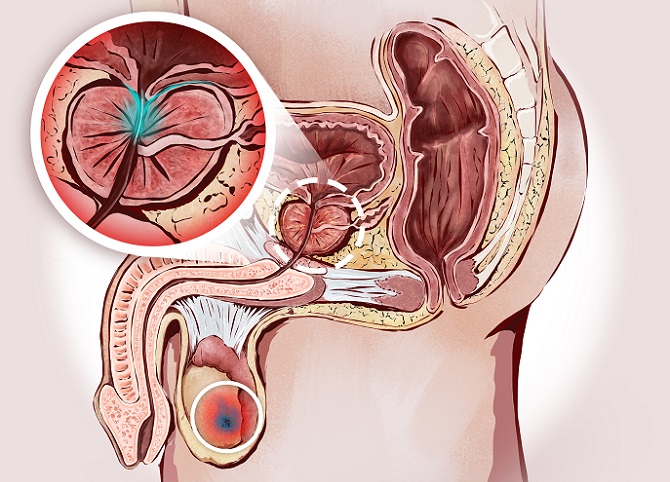Prostate cancer and what are its signs

Prostate cancer lodges in one of the glandular parts of the male reproductive system known as the prostate, a common disease in older men.

The size of the gland changes as the years progress, its growth is rapid during puberty due to the increase in male hormones found in the body, such as dihydrotestosterone and testosterone. For this reason, it is important to know the reactions of prostate cancer and what its signs are in the body and thus resort to adequate and immediate treatment.
Table of Contents
3 common causes of prostate cancer.
These are some of the most frequent causes of the appearance of prostate cancer, and they may or may not be related to each other, but they are usually the main conditions where it originates.
Age.
Disease that commonly appears from the age of 45 and the chances of developing it increase with age. Studies reveal that 80% of men with prostate cancer are over 60, however, there have been cases where this ailment occurs in people under 40 years of age.
Race or ethnic group.
Prostate cancer is a type of cancer that frequently strikes black men and they are more likely to die faster than other ethnic groups if they are not treated early. This disease does not develop as much in Asian Americans and Hispanics-Latinos, so far, the reasons for these racial and ethnic differences are not clear.
Genetic factors.
In some cases, prostate cancer develops due to a hereditary or genetic factor. If a person’s father or brother has this disease, the risk that he or she will also develop it is doubled. The risk is higher when you have relatives with this problem, especially if the relatives were young when this type of cancer was diagnosed.
Signs of prostate cancer.
The formation of early prostate cancer is not usually accompanied by symptoms, but already in a more advanced stage it can present certain noticeable, uncomfortable and painful symptoms, some of them are usually the following:
Inability to urinate.
The inability to urinate or the complete absence of urine becomes a medical emergency. In the initial phase, when the tumor is limited to the prostate, it can be accompanied by mild obstructive symptoms that are easily applicable to benign hyperplasia, such as reduction of the caliber or interruption of the urine stream, urinary incontinence and increased urinary output frequency of urination. This sign can also include slow urinary flow or the need to urinate more often at night.
Hip or back pain.
The prostate cancer can cause frequent pain in the hip, chest or other areas due to the spread of cancer to the bones. This sign may be indicating that the cancer is beginning to develop, for this reason it is necessary to go immediately to the specialist to treat this condition as severely as possible.
Night urination.
The prostate cancer is a condition that can cause nocturnal micturition men older than 45 years. When the disease is advanced, a person may wake up several times throughout the night to urinate, a state known as nocturia. It is normal for urine to reduce in quantity and increase its concentration during the night, however, patients with nocturia get up more than once to go to the bathroom.
Blood in semen.
This problem is caused by cancer and can be caused by inflammation, infection or injury somewhere along the male reproductive system. It may be an indication of a problem in the urethra, epididymis, or testicles. In other countries it is known as hematospermia which can be undetectable or visible in the clear ejaculation of man. Some of the associated symptoms can be: pain in stools, swelling and tenderness in the scrotum, lumbago and fever or chills.
There are other non-cancerous diseases that cause the same symptoms. For example, a person who does not have a cancerous problem, called BPH or an enlarged prostate, may have the same signs. If prostate cancer has developed outside of the prostate gland, you may experience signs like weight loss for no apparent reason, fatigue, back pain, thigh pain, men and other bones.
Recommendations to avoid prostate cancer.
You can follow a series of tips and recommendations to avoid this type of cancer, but there is always the hereditary factor that can influence, but you can adopt certain styles and habits of life that greatly reduce the chances of contracting prostate cancer.
Exercise constantly.
Research on prostate cancer has revealed that most men who adopt an exercise plan may be less likely to develop this disease. Exercising every day has a number of health benefits, not only to combat this problem but to reduce heart conditions and other types of cancers as well.
Reduce the amount of fat.
It is important to limit fat-based foods, the ideal is to eat a healthy and balanced diet that provides the body with vitamins and minerals. You can opt for lean cuts of meat and low-fat dairy, sprinkle nuts or seeds on salads instead of cheese. The daily consumption of fruits and vegetables helps to avoid prostate cancer in men.
Avoid self-medicating.
Each body is different and therefore can react in the opposite way than expected. For this reason, it is recommended not to use any type of medicine. If you opt for natural remedies it will be much better, in this way you can prevent prostate cancer and have a better life.


